Top Strategies for Cleaning Bathroom Quartz Countertops
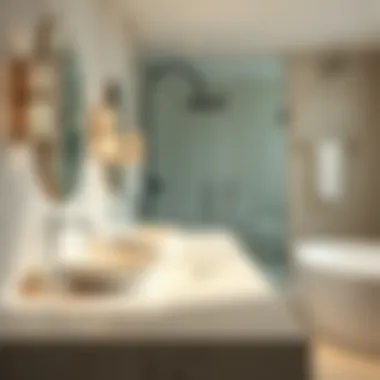
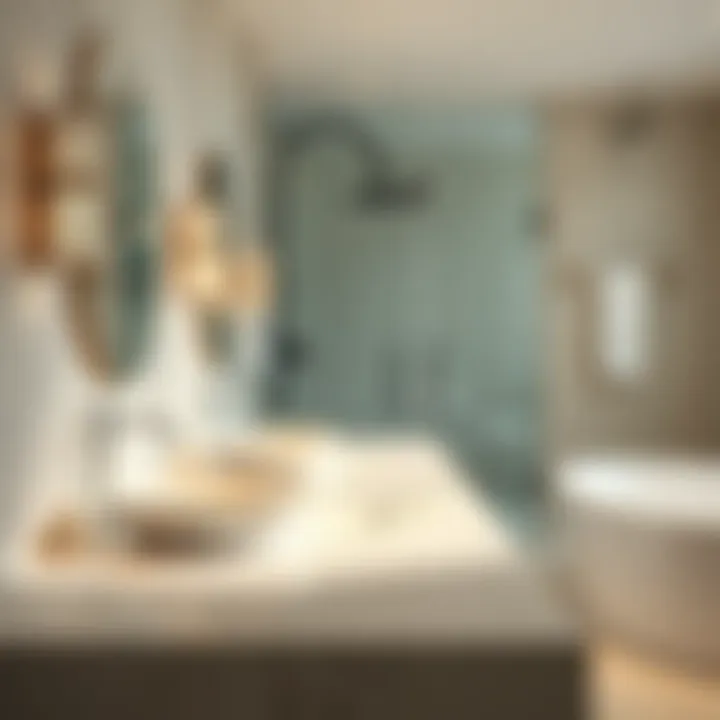
Intro
Maintaining the allure and functionality of quartz countertops in the bathroom can be quite the task for homeowners. These surfaces, known for their resilient characteristics, require a nuanced approach to cleaning and care. Unlike natural stones, quartz countertops are engineered, combining natural stone with resin, which allows them to come in a wide array of colors and patterns. Yet, keeping them sparkling and hygienic is essential for both aesthetics and hygiene. Understanding effective cleaning strategies not only prolongs their lifespan but also preserves their lustrous appearance.
In this guide, we will delve into various cleaning techniques, suitable products, and optimal maintenance schedules for quartz countertops. We aim to arm readers with the knowledge necessary to achieve a gleaming bathroom environment without compromising the integrity of the surfaces.
Current Trends
Considering the evolving tastes in home decor, current trends surrounding quartz countertops are fascinating to observe. Bathrooms now often reflect a fusion of style, comfort, and practicality. A few key aspects stand out in this arena:
Color Palettes
- Soft Pastels: Light shades of pinks, greens, and blues are making waves, creating a serene atmosphere in bathrooms.
- Bold Dark Tones: Deep blues and blacks offer a dramatic contrast to white fixtures, showcasing an elegant statement.
- Natural Stone Looks: Patterns mimicking marble or granite remain popular, giving the appearance of luxury without the maintenance hassles.
Popular Styles
- Minimalistic Designs: A focus on clean lines and uncluttered spaces are driving the minimalist trend.
- Spa-Like Retreats: Textured finishes and integrated sinks present a serene escape from the everyday bustle.
- Mixed Materials: Pairing quartz with woods and metals creates a unique, layered aesthetic, elevating the overall bathroom design.
By staying attuned to these trends, homeowners can make informed choices that not only enhance the beauty of their bathrooms but also align with prevailing styles. The right choice of quartz can create cohesion in a space, tying various elements together wonderfully.
Visual Ideas
For those looking to spark some inspiration, visual ideas can truly ignite creativity. Imagine soaking in an elegantly styled bathroom where quartz countertops serve as a focal point.
- For instance, a gallery showcasing before-and-after transformations can illustrate how quartz can elevate the space from ordinary to extraordinary.
- Consider images that depict the seamless integration of quartz with different fixtures and finishes in diverse color schemes to illustrate versatility. A visual spread could highlight small tweaks that yield significant reception in overall design.
"Visual representation can significantly enhance the comprehension of potential designs, helping homeowners envision the possibilities within their own spaces."
Maintenance plays a critical role in ensuring that these stunning designs remain intact. Therefore, discussing practical cleaning methods and preventive measures will help readers maintain both the aesthetics and durability of their quartz countertops in the bathroom. By understanding how to clean and care for these surfaces, homeowners can keep their investment pristine for years to come.
Understanding Quartz Countertops
When it comes to countertops, especially in a bathroom, quartz stands out as a top contender. It's not just about looks; understanding quartz countertops is crucial for maintaining their beauty and longevity. This section dives into the composition and properties of quartz, along with its benefits specifically in bathroom applications.
Composition and Properties
Quartz countertops are primarily made from roughly 90% crushed natural quartz combined with resins and pigments. This unique blend gives quartz its signature strength and resilience. Unlike natural stones, which can have variable quality, quartz offers a more consistent surface, making it a popular choice for many homeowners.
One significant property of quartz is its non-porous nature. This means that liquids are less likely to penetrate the surface, reducing the chances of staining and bacterial growth—a vital consideration for a bathroom countertop. Additionally, quartz countertops are highly durable, resisting scratches and heat better than many alternatives.
"The durability of quartz means that it can endure the daily wear and tear of bathroom tasks without showing much of age."
This durability also translates into lower maintenance; the non-porous surface makes routine cleaning a breeze, as spills can be wiped away without fear of damage. Furthermore, the variety of colors and patterns available can match any design aesthetic, from sleek modernism to classic sophistication.
Benefits in Bathroom Applications
There are several advantages to using quartz in a bathroom setting. Firstly, its resistance to moisture and humidity makes it an excellent choice in an environment where steam and water are abundant. This ensures that the countertops remain not only stylish but also safe from mold and mildew, common foes in these spaces.
Some key benefits include:
- Low Maintenance: Cleaning quartz is straightforward; a gentle detergent and warm water are often all that's needed, unlike natural stones that might require special cleaners.
- Heat Resistance: While excessive heat can damage any countertop, quartz can tolerate moderate heat, making it easier to handle hot appliances or items in the bathroom.
- Variety of Designs: Homeowners can choose from a plethora of styles, which allows for a more tailored and personal space.
- Durability for Family Life: Whether it's kids splashing water or the constant movement of everyday life, quartz stands up to the challenges with grace.
Cleaning Essentials for Quartz Countertops
Keeping quartz countertops in the bathroom clean is not just about aesthetics; it’s about hygiene and prolonging the life of the material. Regular maintenance can keep your countertops looking as good as new. Understanding the essentials in cleaning can make this task not only easier but also more effective. Knowing what supplies to use and the right tools for the job can significantly streamline your cleaning routine, sparing you the hassle of stubborn stains and dull surfaces.
Recommended Cleaning Supplies
When it comes to cleaning quartz countertops, it's critical to use the right products that maintain the surface without causing damage. Here are some essentials:
- pH-balanced cleaner: Using anything harsh or abrasive can scratch quartz. Look for a solution specifically designed to be safe for stone surfaces.
- Microfiber cloths: These are gentle yet effective at wiping away grime without risking scratches. They also trap dust and particles better than standard cloths.
- Warm water: Often, just a little warm water will do the trick for day-to-day spills.
- Glass cleaner: For those glossy finishes, a non-ammonia glass cleaner can bring back the shine nicely, though sparingly.
- Baking soda: For tougher spots, a paste made from baking soda and water can be effective. It's a mild abrasive but tough on stains.
- Vinegar (optional): While it works wonders on many surfaces, it’s best to use vinegar sparingly as it can dull the surface finish if used too frequently.
These items, combined with a little regular upkeep, can ensure your quartz remains both beautiful and functional.
Tools for Effective Cleaning
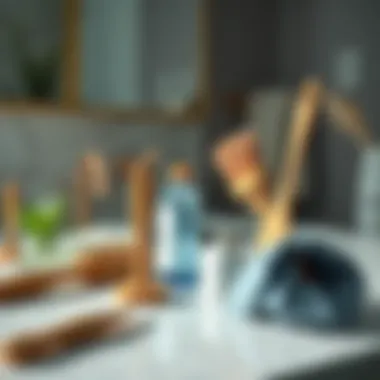
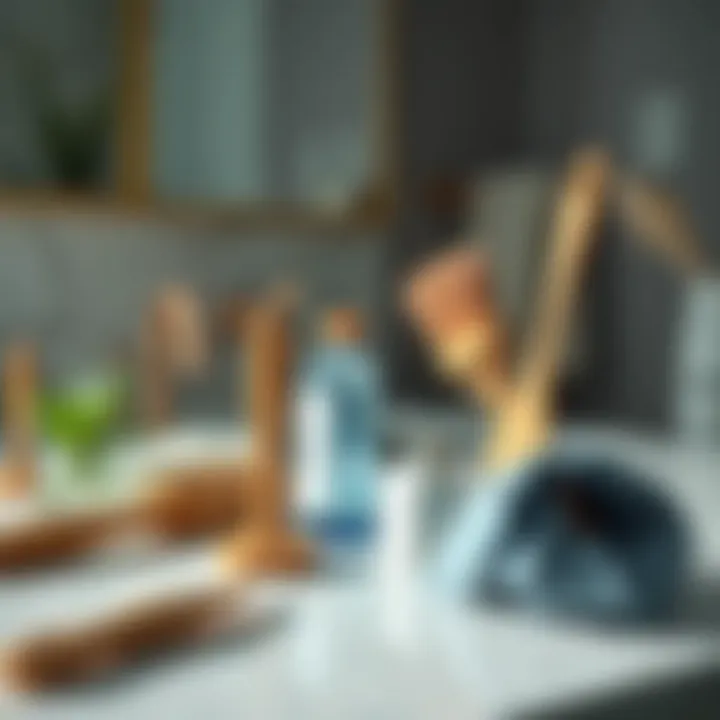
Having the right tools makes a world of difference in maximizing efficiency while cleaning your quartz countertops. Consider adding the following:
- Soft bristle brush: For corners and edges where dirt tends to accumulate, a brush can reach those stubborn spots effectively without scratching the surface.
- Sponge with a smooth side: Opt for a high-quality sponge that won’t leave scratches. One side for scrubbing and the other for gentle wiping can save time.
- Squeegee: Great for showers and adjoining tiles, they help prevent water spots from forming on both the counter and directly around it.
- Spray bottle: This can be handy for mixing your own cleaning solution, especially for homemade remedies like a mild soap and water mix.
- Bucket: Useful for larger jobs, particularly if you're cleaning multiple surfaces at once or doing extensive maintenance.
Using the right supplies and tools allows for a thorough clean without the worry of damaging your countertops. It’s about making sure every inch is cared for - after all, good maintenance now avoids problems later on.
Daily Cleaning Routine
Maintaining quartz countertops in the bathroom requires a methodical daily cleaning routine. This routine not only helps in keeping the surface shining but also ensures longevity and hygiene. When you clean quartz every day, you’re actually creating a barrier against stains and damage from daily use. Regular care can make a world of difference in how your countertops look and last.
Moreover, it's important to understand that quartz can absorb substances if spills are not cleaned promptly. This daily habit can prevent hard-to-remove stains, saving time and effort in the long run. In addition, a consistent cleaning routine keeps germs at bay, crucial for surfaces in a bathroom where moisture is a common concern.
Surface Preparation for Cleaning
Before diving into the cleaning process, prepping the surface is essential. Here’s how you can do it:
- Clear the Surface: Remove any items like soap dispensers or decorative pieces from your countertops. This step creates an unhindered workspace.
- Dust and Debris: Use a dry cloth or duster to wipe away loose dirt and debris. This ensures that you are not rubbing these particles into the quartz surface during the actual cleaning.
- Assess for Damage: Take a moment to inspect the surface for any visible scratches or chips. A keen eye can help catch issues early, allowing you to address them before they escalate.
Step-by-Step Cleaning Process
After preparing the surface, follow these steps for an effective cleaning process:
- Gather Your Supplies: Make sure you have your cleaning agent, soft sponge, and microfiber cloth ready. Recommended cleaning agents include mild dish soap mixed with water or a dedicated quartz cleaner.
- Apply Cleaning Solution: Use a soft sponge to apply the cleaning solution. Make sure you don’t saturate the cure, as excess moisture can seep into seams and cause issues.
- Gentle Scrubbing: With the sponge, gently scrub the surface in a circular motion. Avoid abrasive cleaners or scrubbers, as these can dull quartz surfaces over time.
- Rinse Thoroughly: After scrubbing, rinse the surface with clean water. It's crucial to remove all soap residues because they can leave streaks or create a film over time.
- Dry with a Microfiber Cloth: Finally, dry the countertop with a clean microfiber cloth. This step not only leaves the surface streak-free but also enhances the shine of the quartz.
By following this straightforward routine, you ensure that your quartz countertops remain pristine, avoiding potential stains and keeping them looking their best. Regular maintenance is key in creating a healthy bathroom environment, supporting both hygiene and aesthetic appeal. For more about bathroom hygiene practices, you can check BBC Good Food's cleaning tips.
"An ounce of prevention is worth a pound of cure." - Benjamin Franklin
Utilizing effective cleaning strategies leads to fewer headaches down the road.
Dealing with Stains and Spills
Maintaining the pristine look of your quartz countertops in the bathroom is imperative, not just for aesthetic appeal, but also for hygiene. Understanding how to deal with stains and spills is crucial for sustaining the countertop's quality over time. Regular maintenance prevents stubborn stains from setting in, which can compromise the durability and overall resilience of quartz surfaces.
When those unexpected spills happen—be it toothpaste, shampoo, or a wayward drop of nail polish—knowing how to respond swiftly and effectively can save you considerable trouble down the road. Not all messes are created equal, and familiarizing yourself with the variety of common stains that might occur will arm you with the knowledge needed to tackle them head-on, preserving your quartz’s integrity.
Identifying Common Stains
Identifying the type of stain is half the battle. Here are some common culprits you might encounter:
- Organic stains: These typically arise from food, drinks, or other biological sources. Coffee spills and fruit juices are standard offenders.
- Inorganic stains: Caused by materials that don't originate from living organisms, like rust or paint. Nail polish is a classic example.
- Chemical stains: These come from substances like bleach or hair dye that may accidentally splash onto the surface.
- Hard water deposits: Unpleasant spots often left behind by water that evaporates and leaves minerals behind, especially in moist bathroom environments.
By pinpointing the nature of the stain, you set yourself up for success in removal. If it’s organic, a different approach is needed compared to addressing a chemical mark. Keeping an eye out for these stains can prevent you from having to endure more extensive cleaning measures later on.
Effective Removal Techniques
Once you've identified the stain, the next step is removal, which often requires quick action. Here are a variety of effective techniques tailored for different stain types:
- For organic stains:
- For inorganic stains:
- For chemical stains:
- For hard water deposits:
- Use a soft cloth with warm, soapy water to gently scrub the area. If necessary, a mixture of water and vinegar can work wonders, but remember to rinse it thoroughly, as acidic solutions can damage quartz if left on too long.
- Nail polish and paint require an entirely different strategy. Dab a small amount of rubbing alcohol on a clean cloth and blot the stain gently—avoid scrubbing to prevent scratching the surface.
- Immediate action is your best ally. If bleach splatters occur, rinse the area with plenty of water to dilute any remaining chemical, followed by gentle scrubbing with soap and water.
- A paste made of baking soda and water can be effective. Apply the paste, allow it to sit for about 15 minutes, and then wipe it clean with a damp cloth, ensuring no residue is left behind.
Important Note: Always test a small, discreet area before applying any cleaner or method to ensure compatibility with your quartz.
By employing these targeted techniques, you can enhance the longevity of your quartz countertops while keeping them looking fresh and inviting. Regularly tending to stains as they arise leads to a cleaner, safer environment for your home and family.
Preventative Maintenance Measures
Preventative maintenance measures play a crucial role in extending the life and appearance of quartz countertops in bathroom settings. Many homeowners often overlook this aspect in their cleaning routines, yet these practices can save time, effort, and money over the long haul. Understanding how to protect your quartz surfaces not only ensures they remain sparkling and hygienic, but also avoids costly repairs from damage that could have been prevented.
Regular maintenance allows you to address minor issues before they escalate. For instance, a simple daily wipe-down can thwart the buildup of grime that clings stubbornly to surfaces. Proactive strategies help maintain the beautiful aesthetic of quartz, which is why a comprehensive approach is essential for anyone looking to preserve these elegant surfaces.
Understanding Coating Options
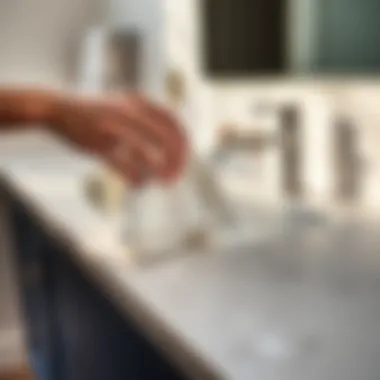
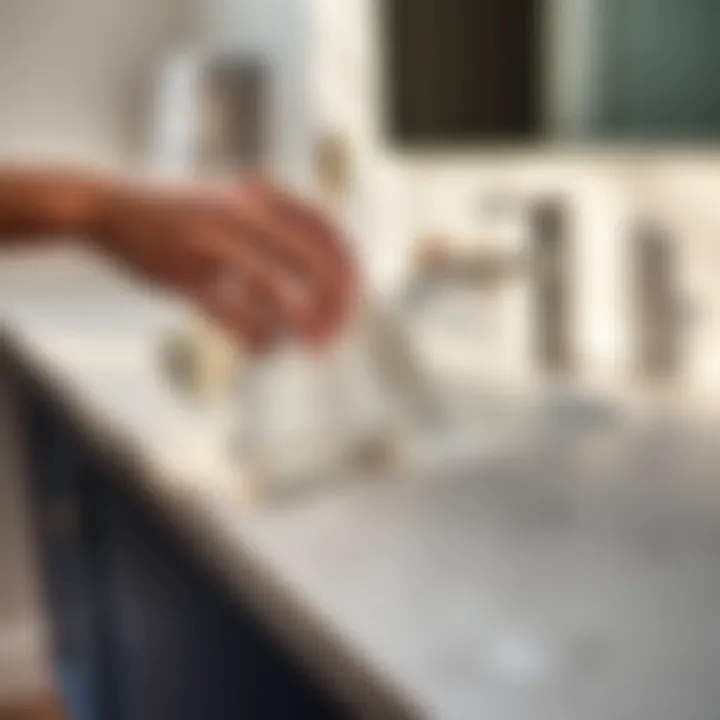
To further extend the life of your quartz countertops, consider applying a sealant designed for quartz surfaces. These coatings can provide an additional layer of protection against stains, scratches, and heat. It is important to note, however, that not all quartz countertops are created equal when it comes to coatings.
Types of Sealants:
- Nanotechnology Sealants: These are high-tech options that bond with the surface at a molecular level, offering superior protection and durability.
- Wax Sealants: While they provide decent protection, they need to be reapplied more frequently. They can help maintain gloss but may get slippery.
- Penetrating Sealants: These soak into the stone and work to prevent stains from becoming permanent.
Before applying any sealant, check with the quartz fabricator or supplier to ensure compatibility. It’s wise to do a spot test on a hidden area to guarantee it doesn’t alter the appearance of your countertops.
Identifying High-Risk Areas
In bathrooms, certain areas are more susceptible to damage and staining than others. Identifying these "hot spots" helps you tailor your cleaning and maintenance strategies effectively.
- Around the Sink: This area often sees excess water, soap, and toothpaste drip-offs. Regular inspection and cleaning around the sink's edges can help combat potential staining.
- Near Shower Enclosures: Moisture from showers can lead to mold and mildew buildup. Ensuring these areas are well-ventilated is crucial.
- Countertops Near Hot Tools: If you place hair styling tools or other heated items directly on the counter, it can lead to thermal shock and even cracks. Using trivets or mats can mitigate this risk.
By keeping an eye on these high-risk areas, you can implement targeted cleaning schedules. Make it a habit to inspect and maintain these spots regularly, so you catch small problems before they develop into larger nuisances.
"An ounce of prevention is worth a pound of cure." Keeping your quartz countertops clean and protected can save you significant hassle and expense down the line.
For more information on quartz maintenance and cleaning strategies, consider checking out resources on home improvement at Home Depot and renovation tips at This Old House.
Long-Term Care Practices
Maintaining the allure and functionality of quartz countertops goes beyond a simple daily wipe-down. It entails long-term care practices that are pivotal to ensuring these surfaces remain splendid and durable over the years. Proper care prolongs their life and keeps them looking sharp, thereby adding value to your home. Most importantly, understanding these practices helps prevent major repairs or replacements down the line, which can be costly and disruptive.
Comprehensive Cleaning Strategies
Effective long-term care involves utilizing comprehensive cleaning strategies tailored specifically for quartz. Here’s a closer look at these strategies:
- Develop a Routine: It’s essential to establish a regular cleaning schedule. A good rule of thumb is to implement a weekly deep clean, removing any buildup that occurs from daily use.
- Use the Right Cleaners: Opt for pH-balanced cleaners that are specially formulated for quartz. Avoid abrasive materials or acidic cleaners that can wear away the surface.
- Microfiber Cloths: These are your best friends. They trap dust and grime without scratching the surface, making them ideal for daily cleaning.
- Spot Cleaning: If you happen to spill something like wine or sauce, clean it immediately. Use a damp cloth and a mild detergent to prevent stains from setting.
- Periodic Deep Clean: Depending on your countertop’s usage, consider a more intensive clean every few months involving hot water and a couple drops of dish soap. This helps tackle any deeper grime.
Incorporating these practices consistently into your cleaning routines will contribute significantly to the aesthetic appeal and longevity of your countertops.
Maintenance Scheduling and Checklists
A maintenance schedule not only brings structure to your countertop care but also highlights essential tasks needed to keep your quartz looking its best. Use the following checklists to help streamline your maintenance.
Daily Maintenance Tasks:
- Wipe counters with a damp microfiber cloth at least once a day.
- Clean up spills immediately to avoid staining.
- Check for any visible damage or scratches.
Weekly Maintenance Tasks:
- Perform a more thorough cleaning using a pH-balanced cleaner.
- Inspect the seals on the edges of the countertop; ensure they remain intact.
- Run a specialized cleaning agent, if necessary, to ensure sterile surfaces.
Monthly Maintenance Tasks:
- Evaluate the overall condition and shine of your countertops.
- Reapply any necessary sealant as per the manufacturer’s guidelines.
- Remove any buildup or stains that may have settled over time.
Using these checklists ensures that every angle of maintenance is covered, making your long-term care practices effective and manageable. Setting reminders or using a calendar can help you stay on track with this schedule.
By following these long-term care strategies, you’ll be equipped to maintain the splendid look of your quartz countertops while ensuring their functionality for years to come.
Common Misconceptions About Quartz
Understanding the common misconceptions surrounding quartz countertops is critical, especially for homeowners looking to maintain both the appearance and functionality of these surfaces. As quartz has grown in popularity, so too have misunderstandings about its care and durability. By dispelling these myths, homeowners can avoid costly mistakes and unsightly damages.
What Not to Do with Quartz
It’s essential to be aware of actions that can harm your quartz countertops. Here are a few crucial missteps to steer clear of:
- Avoid Harsh Chemicals: Using abrasive cleaners or heavy-duty chemical solutions can scratch the surface and dull the sheen of quartz. Stick to gentle dish soap mixed with warm water.
- No Heat Exposure: Placing hot pots and pans directly on quartz can lead to thermal shock, resulting in cracks. Using trivets or hot pads can help prevent this.
- Don't Use a Sharp Knife: While quartz is scratch-resistant, it’s not scratch-proof. Always use cutting boards to maintain it's look and quality.
- Neglecting Spills: Don't let spills sit for long. Even though quartz is non-porous, substances like wine or citrus juice can cause staining if not cleaned promptly.
By being mindful of these habits, you can keep your quartz countertops looking pristine for years.
Debunking Standard Myths


Several standard myths persist regarding quartz countertops, leading to confusion. Let’s crack some of these:
- Quartz is the Same as Granite: This is a common misunderstanding. While both are hard surfaces, quartz is engineered from ground stones and resins, which makes it non-porous. Granite is natural stone, meaning it can absorb stains if not sealed properly.
- Quartz is Indestructible: Though quartz is durable, it’s not invincible. High-impact activities should be avoided, as surface chipping is still a possibility.
- Regular Sealing is Necessary: Unlike natural stones, quartz countertops do not require regular sealing. Their non-porous state means they resist bacteria and staining without additional treatment.
- You Can Use Ammonia-Based Cleaners: Ammonia can cause dulling or damage to quartz surfaces. Stick to pH-balanced soap and water for routine cleaning instead.
"Understanding the material's true nature can offer confidence in one's choices and ensure quartz countertops maintain their beauty and functionality for a long time."
By addressing these misconceptions, the true nature and care required for quartz countertops become clearer. Knowledge is power, and understanding these facts enables homeowners to make informed decisions about their countertop maintenance.
Eco-Friendly Cleaning Solutions
In the modern era, a growing awareness of environmental issues often prompts homeowners to rethink cleaning methods. This dedication to sustainability naturally extends to cleaning quartz countertops in bathrooms, where harsh chemicals can do more harm than good—not only to your health but also to the environment. Eco-friendly solutions are not just a trend; they embody responsible living. They help preserve aquatic life, reduce your carbon footprint, and promote better indoor air quality.
Using greener cleaning practices can provide numerous benefits, such as being safe for your family and pets while effectively tackling stains and maintaining shine.
DIY Cleaning Alternatives
Creating your own cleaning solution is so simple and cost-effective! You can find most ingredients right in your kitchen. Here are a few eco-friendly DIY options:
- Vinegar and Water Mixture: Combine equal parts of white vinegar and water in a spray bottle. Spray on the countertop, let it sit briefly, then wipe it down with a clean cloth. Vinegar's acidity helps dissolve tough residues and grime.
- Baking Soda Paste: Mix baking soda with water to form a paste. Apply it on tough stains, leave it for a few minutes, then scrub gently with a soft sponge and rinse. This method can work wonders on stains without scratching the surface.
- Lemon Juice: The natural acidity in lemon juice can lift dirt as well as add a fresh scent. It also has antibacterial properties. Simply apply lemon juice directly where needed, let it sit for several minutes, and rinse.
These methods not only help to maintain your quartz countertops but also reduce reliance on commercial products laden with chemicals.
Sustainable Products for Quartz
If you're looking for pre-made solutions, there’s a wealth of sustainable products on the market designed specifically for quartz countertops. These products often feature biodegradable ingredients, ensuring that they effectively clean without causing long-lasting harm to the environment. When searching for sustainable cleaner brands, consider the following:
- Look for certifications, such as Green Seal or EcoLogo. These labels indicate that products have met stringent environmental standards.
- Read the ingredients list. Avoid products that include harsh phosphates and chlorine bleach.
- Choose formulae packaged in eco-friendly containers. Recyclable packaging helps reduce waste, contributing to an overall sustainable practice.
Some reputable brands that produce sustainable cleaning solutions for quartz include Seventh Generation and Method.
When to Seek Professional Cleaners
Maintaining quartz countertops can feel like a walk in the park for the most part. They are durable and relatively low-maintenance, but there are times when the situation at hand demands more than just elbow grease and store-bought cleaners. Knowing when to call in the professionals can save you time, money, and even heartache if you find your countertops in a tricky position.
Identifying Complex Issues
The kitchen and bathroom are busy hubs in our homes, often taking a beating from spills, stains, and daily wear and tear. However, not all blemishes are created equal.
Sometimes, the damage runs deeper than a simple stain. Here are a few signs that professional help may be warranted:
- Deep Scratches: If your countertop has developed scratches that do more than just mar the surface, you may need a pro who can polish or refinish the material to restore its beauty.
- Persistent Stains: Some stains simply won’t budge. If your DIY efforts have fallen flat and left you frustrated, it’s time to admit defeat and call the experts.
- Seams and Adhesive Issues: If you notice gaps where the pieces of quartz meet, or if the adhesive is failing, professional repairs can ensure a seamless look and integrity of the surface.
- Chemical Damage: Some cleaning agents can wreak havoc on quartz surfaces. If you suspect you've accidentally used a harmful chemical that’s resulted in dullness or discoloration, it’s best to seek out expert advice before attempting a fix on your own.
Evaluating the Cost-Benefit of Services
"You get what you pay for" can ring true, especially when it comes to home maintenance. Engaging professional cleaners can feel like an unnecessary expense, but often it's a wise investment that pays off in the long run. Here are some considerations:
- Expertise: Trained professionals bring knowledge that can help preserve the beauty and functionality of your quartz. You may be paying a bit more, but it is to gain insights and skills that most homeowners don’t have.
- Time Savings: Your time is valuable. Hiring professionals can free you up to tackle other household tasks, rather than spending hours on intensive scrubbing or repair attempts.
- Long-Term Savings: While the upfront cost of hiring a professional cleaner may seem steep, consider it an investment. Quality maintenance can prolong the life of your countertops, potentially saving you from costly replacements down the line.
- Peace of Mind: Knowing that the highest standards of care are being applied to your countertops can ease your worries. You can relax knowing that the work is being done correctly, without the stress of potential mistakes.
Remember, investing in your home is predominantly about maintaining its value and aesthetic appeal. Professional cleaners can provide the expertise needed to keep your quartz countertops looking their absolute best.
Finale and Best Practices
Cleaning and maintaining quartz countertops in the bathroom is essential for ensuring their longevity and aesthetic appeal. These surfaces promise durability, but to uphold their visual charm and hygiene, a thoughtful cleaning regimen is necessary. In this article, strategies for effective cleaning, identifying common stains, and preventative measures have been highlighted. By adopting these best practices, homeowners can not only keep their countertops looking pristine but also prolong their lifespan.
One of the most critical elements of cleaning quartz surfaces lies in using the right products. Many individuals may not realize that harsh chemicals can damage these countertops, leading to costly repairs or replacements. Instead, utilizing gentle cleansers and soft cloths is vital. Regular maintenance can help mitigate staining and surface dullness.
In addition, the importance of developing a cleaning routine should not be underestimated. Setting a consistent schedule allows house owners to tackle grime before it has a chance to set in, making the job easier in the long run. Furthermore, understanding the areas of higher risk for stains—such as around sinks and near mirrors—can guide more focused efforts in maintaining these surfaces.
Moreover, when faced with stains or spills, knowing how to respond quickly can make all the difference in preserving the surface quality. Staying informed of common mishaps and how to correct them will give house owners confidence in their ability to maintain their countertops.
Lastly, it's crucial to remember that sometimes professional intervention may be necessary. Complex issues or heavy staining may require expert touch. Evaluating the cost of such services against the potential for damage can help make informed decisions.
"An ounce of prevention is worth a pound of cure."
While it may be tempting to overlook routine cleaning due to a busy lifestyle, taking the time to implement these best practices will inevitably pay off in the long run. The investment in maintaining not just the beauty, but also the functionality of quartz countertops is one that results in a refreshed and inviting bathroom environment.
Key Takeaways
- Use gentle cleaning products to prevent damage.
- Develop a consistent cleaning schedule for best results.
- Identify high-risk areas for targeted maintenance.
- Respond quickly to spills and stains to avoid permanent marks.
- Know when to seek professional help for complex issues.
Final Thoughts on Quartz Maintenance
Maintaining quartz countertops is more than just a chore—it's a commitment to preserving a beautiful and functional space in your bathroom. A well-cared-for countertop not only enhances the overall aesthetics of the room but also contributes positively to your day-to-day life. It's crucial to equip yourself with the right knowledge and tools for effective maintenance. Through simplified routines, informed practices, and recognizing when outside assistance is needed, you're on your way to ensuring your quartz surfaces remain as dazzling as the day they were installed. Caring for quartz is not just about cleaning; it's about ensuring that it continues to serve its purpose as a stunning centerpiece of your bathroom.



